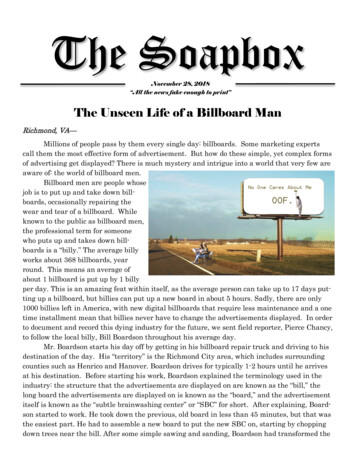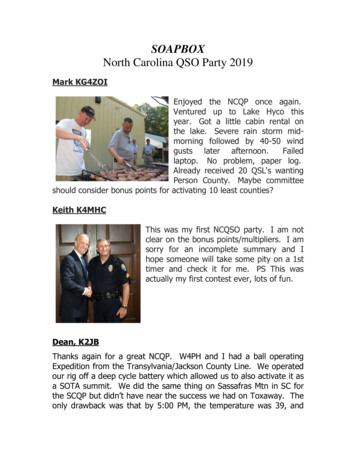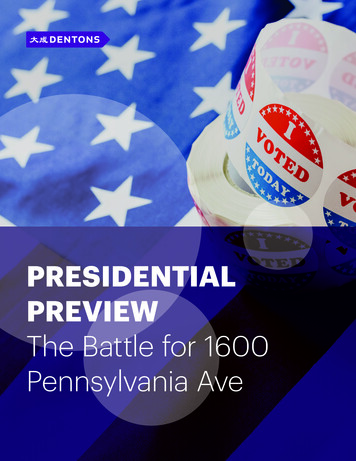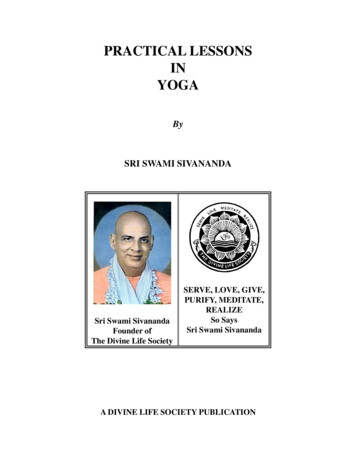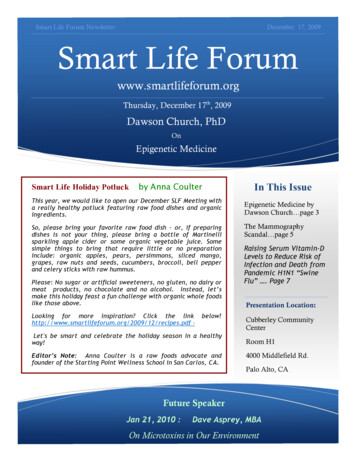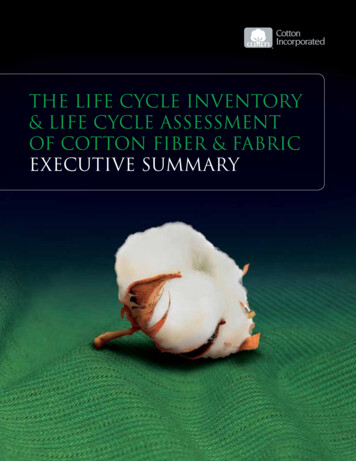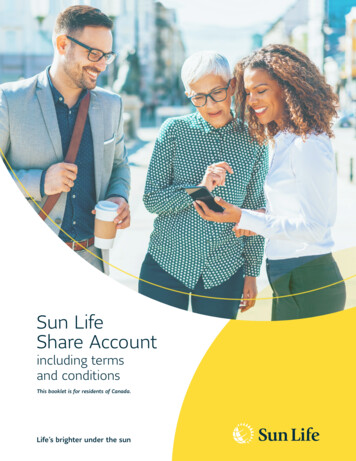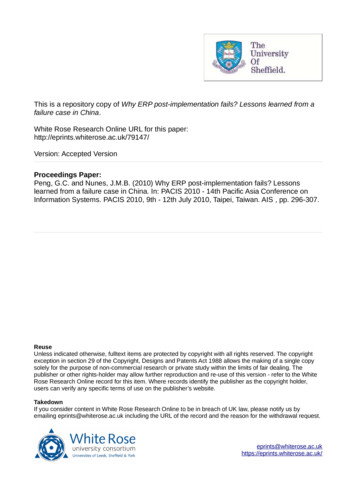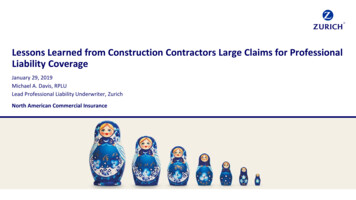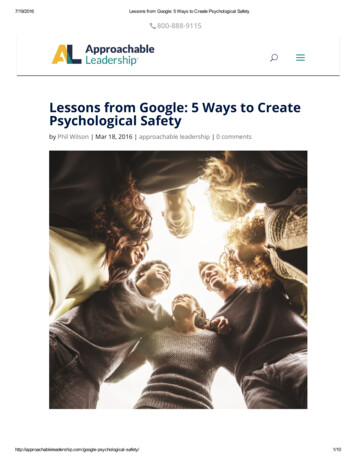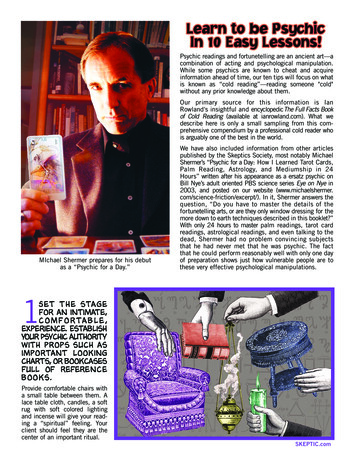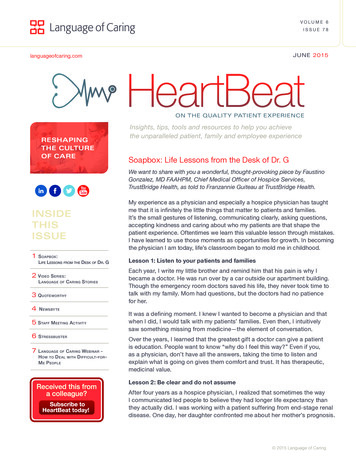
Transcription
VOLUME 6ISSUE 78JUNE 2015languageofcaring.comON THE QUALITY PATIENT EXPERIENCERESHAPINGTHE CULTUREOF CAREInsights, tips, tools and resources to help you achievethe unparalleled patient, family and employee experienceSoapbox: Life Lessons from the Desk of Dr. GWe want to share with you a wonderful, thought-provoking piece by FaustinoGonzalez, MD FAAHPM, Chief Medical Officer of Hospice Services,TrustBridge Health, as told to Franzannie Guiteau at TrustBridge Health.My experience as a physician and especially a hospice physician has taughtme that it is infinitely the little things that matter to patients and families.It’s the small gestures of listening, communicating clearly, asking questions,accepting kindness and caring about who my patients are that shape thepatient experience. Oftentimes we learn this valuable lesson through mistakes.I have learned to use those moments as opportunities for growth. In becomingthe physician I am today, life’s classroom began to mold me in childhood.INSIDETHISISSUE1 S oapbox:Life Lessons from the Desk of Dr. G2 Video S eries:L anguageofCaring S tories3 Q uoteworthy4N ewsbyte5 Staff Meeting Activity6S tressbuster7 L anguage of Caring Webinar H ow to D ealM e P eoplewithD ifficult- for -Lesson 1: Listen to your patients and familiesEach year, I write my little brother and remind him that his pain is why Ibecame a doctor. He was run over by a car outside our apartment building.Though the emergency room doctors saved his life, they never took time totalk with my family. Mom had questions, but the doctors had no patiencefor her.It was a defining moment. I knew I wanted to become a physician and thatwhen I did, I would talk with my patients’ families. Even then, I intuitivelysaw something missing from medicine—the element of conversation.Over the years, I learned that the greatest gift a doctor can give a patientis education. People want to know “why do I feel this way?” Even if you,as a physician, don’t have all the answers, taking the time to listen andexplain what is going on gives them comfort and trust. It has therapeutic,medicinal value.Lesson 2: Be clear and do not assumeAfter four years as a hospice physician, I realized that sometimes the wayI communicated led people to believe they had longer life expectancy thanthey actually did. I was working with a patient suffering from end-stage renaldisease. One day, her daughter confronted me about her mother’s prognosis. 2015 Language of Caring
VOLUME 6languageofcaring.comISSUE 78She accused me of implying that her mother was getting better. Confusedby this, I asked her what she meant. She reiterated to me what I had toldher: her mother was stable. Her blood pressure was OK, she was makingurine, and her breathing was OK. As a physician, I still did not understandwhat the problem with this was, since all of that information was accurate.She told me this: when her family hears that she is stable and all of thesethings are going OK, they hear that she is getting better. She demanded toknow whether her mother was dying or not.I was mortified at the thought of how many times I had spoken just like this,perhaps creating a false hope for recovery. I should have explained what“stability” in hospice patients meant for her mother’s diagnosis, I should nothave assumed that she understood vague medical terms like “stable.”Lesson 3: Ask patients what they want“I’d givenacademiclectures aboutpatients’perspectiveand needs,and still missedthe mark.”Ten years into my hospice career, I encouraged a CNA to get a patientwith thyroid cancer who had a feeding tube and tracheotomy out of bed.The CNA gave her a bath, took her for a walk in the garden, stationed herwheelchair in the atrium near the waterfall to enjoy the sunshine and laterbrought her in the common area during lunch time. As I was doing rounds,the patient gave me a note complaining about all of the kind things that herCNA did. In her note she explained that the sun hurt her eyes because shehas Glaucoma and she needs special glasses. The waterfall was like torturefor her because she has a feeding tube and could not drink water as wassitting in the cafeteria while everyone ate food she could not have.My first thought was, “How ungrateful!” Yet, as I continued reading, I realized that we never considered her perspective. We should have asked herwhat she wanted. The next day we procured sunglasses before taking herout, gave her something to moisten her mouth, and during her lunch hourwe didn’t take her out of the room. I’d given academic lectures aboutpatients’ perspective and needs, and still missed the mark.Lesson 4: When someone offers a gift of themselves, receive itwithout preconceptionsI visited a couple in a crowded, multi-family home. Their baby had beenborn without most of its brain. I could see they were very poor, and yetthey felt obligated to offer me the best of what they had—a bottle of water.Initially I said no because I didn’t want to take more from them.They were so disappointed. By not accepting their offer, I unintentionallygave the impression that I was better than they were. I did not understandthis at first and continued to decline their attempts at hospitality. The familywas not comfortable with me during the appointment, and I did not understand why. Eventually I accepted the water, and this simple acted createda bond. I confirmed with the father later that he felt as though I was beingdisrespectful by not accepting their acts of kindness.2 2015 Language of Caring
VOLUME 6languageofcaring.comISSUE 78Lesson 5: “Patient” and “Caregiver” are not names, and they do notdescribe a lifetime“Asking aboutwho they aregives patientspower andvalidates them.”In medicine, when you ask about a patient’s medical history, you focus onclinical questions only. You miss the important stories that create who yourpatients are.I take the time to understand my patients. Asking about who they are givespatients power and validates them. We remind them and we are remindedthat they are more than their disease. This is espoused in hospice care.Yet, this simple step is often overlooked. When I began to make it a priority,it opened up a world for me.Lesson 6: Life is a classroomThese lessons have made me not only a better physician, but a betterhuman being, husband and father. Perhaps the most important lesson Ilearned is the importance of family. The same way I have learned to empathize with my patients, I have learned to listen to my family and put myselfin their shoes. I didn’t change who I am; I just changed how I behaved andreacted.Life’s classroom—and the patients who stepped in as professors—havetaught me that clinical expertise can only take you so far. Though being anexcellent clinician is imperative, patients and their families often rememberthe small things for the rest of their lives.Video Series:LANGUAGE OFCARING STORIESWatch a Medical Director and Clinic Manager with PeaceHealth Medical Groupdescribe the impact of the Language of Caring for Physicians program. “I believe that the (Heart-Head-Heart Communication) tool is what transformed mefrom a manager into a leader.”Watch now3 2015 Language of Caring
VOLUME 6languageofcaring.comQUOTEWORTHYNEWSBYTEISSUE 78“We need to make the extra mile the normal mile.”Sean Keyser; Corporate Vice President,Patient Experience; Novant Health“No One Dies Alone”A lonely patient’s request to nurse Sandra Clarke sparked the developmentyears later of this wonderful program that makes volunteers available tocomfort dying patients during their final hours. Watch Sandra describe thebirth of this program.Volunteers (often hospital staff) use the hospital’s intranet to enter timesthey’re available (before or after their work hours or on a day off). They arecalled as needed. Volunteers have access to resources, including a CDplayer and calming music, a journal for recording thoughts and feelings,a sweater, a parking pass, a meal voucher and the list of important phonenumbers. For information about program materials, contact the founderSandra Clarke at TIVITYIDEASUnforgettable People(Thank you to Elizabeth Jacobs, PFAC Leader at Johns Hopkins for this idea.)Purpose: Help your team tune in to powerful experiences with people in theirwork world.1. Ask your team members to share their response to this with apartner or trio: “Tell me about a patient (or coworker) you will neverforget because of your positive experience with them.”2. Ask your team members to share their answer to this with a partneror trio: Tell me about a patient (or coworker) who you think will neverforget YOU because of their positive experience with you .and describe the experience.3. Afterward, ask the whole group: How did it feel to share these stories? What themes came up for you?a. What characteristics or behaviors makepatients and/or coworkers unforgettable?b. What makes US unforgettable topatients/coworkers?4. End by encouraging people to decide every day to makesomeone’s day . So they will have more and more stories to tell.4 2015 Language of Caring
VOLUME 6languageofcaring.comISSUE 78Watch these two videos for personal renewal: Short excerpt on “Deep Listening” from Oprah’sinterview with mindfulness expert Thich Nhat Hanh.STRESSBUSTER 2-minute video on Cultivating Lovingkindnesswith Sharon Salzburg.TUESDAY,June 30,20151–2 PM(EDT)LANGUAGE OF CARINGWEBINAR SERIES PRESENTS.How to Deal with Difficult-for-Me PeopleIn healthcare, we deal daily with people wefind irritating or frustrating. There are alsotimes when we must deliver messages thatpatients and families do not want to hear.Faced with unsettling behavior and the needto give unwelcome news, members of our careand service teams need to communicate withempathy, directness and tact. This webinar helpsto reframe the concept of “difficult people” andstrengthens key communication skills that,by turning up the warmth, turn down the heat.Highlights: Everyone!WEBINAR FACULTYWendy Leebov, Ed.D is Partnerfor Language of Caring. She’s a Words and actions that make matters worse,despite the caregiver’s best intentionspassionate advocate, speaker Using Language of Caring skills to defuseemotionally charged situationshealing environments for In-depth attention to how you can hold yourground with compassion and composure afteryou’ve done everything possible to accommodatethe other person How you can preserve your energy and reducestress in everyday difficult situationsSPACE IS LIMITEDREGISTER NOW!5WHO SHOULD ATTEND?and consultant for creatingpatients, families, and the entirehealthcare team for over 30 years and author ofmore than 12 books for healthcare.INDIVIDUAL 49GROUP (PER CALL-IN LINE)199 If your system wants to purchase several call-in lines, contact us. 2015 Language of Caring
VOLUME 6languageofcaring.comISSUE 78Are Language of Caring Programs Right for Your Organization?REGISTER FOR A FREE WEBINAR OVERVIEW TO FIND OUT.OROverview of Languageof Caring for Staff June 17, 201512–1 PM (EDT)REGISTER NOW!Overview of Languageof Caring for Physicians June 24, 201512–1 PM (EDT)REGISTER NOW!– Discover how these blended learning programs are helping organizationsachieve breakthroughs in the patient experience and patient/family-centered care,as measured by CAHPS improvement– Learn how these programs work and their specific components– Preview our awesome Client Portal for easy access to videos,SIGN UPall materials and and sustainability resourcesTODAY!– Get to know our implementation services that help you jumpstartSPACE ISLIMITEDyour strategy and accelerate your results– Ask your questions!Contact Us!314 300 7701Jill Golde, MA, Dorothy Sisneros, MS, MBAand Wendy Leebov, EdD—partners atLanguage of Caring.Spread the Resources Forward this month’s Heartbeat email to others. Share and tweet the following link: 5/06/life-lessons-doctor-g.pdfReceived this from a colleague? Sign up today!Join our LinkedIn Group “Quality Patient Experience and HCAHPSImprovement” and add to the rich discussions.PLEASE FOLLOW US!Achieving an unparalleled patient experience and a cultureof caring through exceptional communication.6 2015 Language of Caring
Soapbox: Life Lessons from the Desk of Dr. G INSIDE THIS ISSUE 1 Soapbox: Life LeSSonS from the DeSk of Dr. G 2 ViDeo SerieS: LanGuaGe of CarinG StorieS 3 Quoteworthy 4 newSbyte 5 Staff meetinG aCtiVity 6 StreSSbuSter 7 LanGuaGe of CarinG webinar - how to DeaL with DiffiCuLt-for-me peopLe We want to share with you a wonderful, thought-provoking piece by Faustino Gonzalez, MD FAAHPM,
